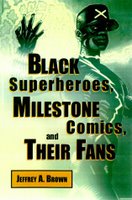 I started reading Jeffrey A. Brown's Black Superheroes, Milestone Comics, and Their Fans on my lunch hour today. I only read the first chapter so far, which basically serves as an introduction. (You know the old addage: "Tell your audience what you're going to say, say it, then tell them what you said.") I found it interesting that he struck on some good points early on, but had some presumptions that weren't so well-founded.
I started reading Jeffrey A. Brown's Black Superheroes, Milestone Comics, and Their Fans on my lunch hour today. I only read the first chapter so far, which basically serves as an introduction. (You know the old addage: "Tell your audience what you're going to say, say it, then tell them what you said.") I found it interesting that he struck on some good points early on, but had some presumptions that weren't so well-founded.I like that he brings up the notion of "cultural capital." It's not a concept I see used much in relation to comic book research, and I think that it's something that needs further exploration. (Hopefully, I'll see more on this in later chapters of his book.) Further, Brown notes how curious it is that, for as much analysis has gone into other media, comic books have comparitively little. He blames that, in part, on the notion that comics are historically a kids' medium and weren't given much respect from the academic community accordingly. Here's where I start taking issue with him.
Yes, comics were looked down upon as the bastard child of "real" literature for many years. But that started getting thrown out the window in the 1960s when colleges started teaching classes around Marvel comics. (Not just literature classes, either! Art, philosophy and religion as well.) By the mid-60s, Stan Lee was fairly in demand at graduation ceremonies and the like. Much has been written about how the 1970s saw social relevance brought into comics, notably with Denny O'Neil's Green Arrow stories and Marvel's non-CCA-approved issues of Amazing Spider-Man. The 1980s was all about bringing gritty realism into comics following the lead of Watchmen and The Dark Knight Returns. And this whole time, comics are also being looked at as an investment with the potential to reap huge financial rewards.
My point is that comics haven't really been exclusively for children for several decades now. And if people keep trying to say that they have been, then the industry will always be viewed as just on the verge of maturing. Sure, comics are still evolving, but they matured decades ago. It's 2006. Isn't about time we bring our perceived baseline up to reality?






0 comments:
Post a Comment